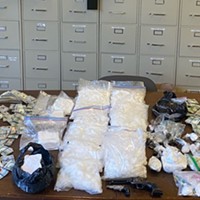The Trump Card
With pot-related asset seizures poised to plummet, the new administration could be a game changer
By Kimberly Wear [email protected] @kimberly_wear[
{
"name": "Top Stories Video Pair",
"insertPoint": "7",
"component": "17087298",
"parentWrapperClass": "fdn-ads-inline-content-block",
"requiredCountToDisplay": "1"
}
]
There's no doubt that marijuana money plays a pivotal role in Humboldt County's economy, not only buoying the balance sheets of local businesses but also the budgets of local police agencies.
Over the years, millions in seized cash and property have gone toward Humboldt County Drug Task Force operations — basically paying for almost everything but personnel — and supplemented other law enforcement agencies.
Now much of that funding — an average of about $300,000 a year to the task force alone — is expected to start drying up with the one-two punch of marijuana legalization and a new state law reining in the legal mechanism for confiscating the ill-gotten gains of criminal activity.
Humboldt County Undersheriff William Honsal has no reservations about the fact that his department and the task force will need to prepare for that eventuality.
"I believe, five years from now, it will be a lot less," he said of the funds, adding the silver lining to those budgetary woes may, in fact, be legal marijuana through taxes levied on commercial grows.
Regardless of whether they see asset forfeiture as a deterrent to crime or an unconstitutional money grab, other legal experts, law enforcement officials, reform advocates and attorneys interviewed for this story also predicted a decline in California's marijuana-related seizures.
But their forecasts came with the same caveat: the Donald Trump card.
Between marijuana's illegal status under federal law and the president's recent comments supporting asset forfeiture, the impacts of California's reforms remain in a gray area, said Theshia Naidoo, legal director of criminal justice at the Drug Policy Alliance.
"We'll see what happens under the Trump administration," she said, adding that "it's a little troubling" that civil asset forfeiture could be "used a little further than it already has been."
Also giving reform advocates pause is Trump's Attorney General Jeff Sessions, who's on record saying, "Good people don't smoke marijuana."
During a speech at the National Association of Attorney Generals winter meeting on Tuesday, the former Alabama senator hinted at a looming federal crackdown, saying the marijuana trade is linked to violence and that he didn't think "marijuana being sold at every corner grocery store" would be good for the country.
"States, they can pass the laws they choose," Sessions said. "I would just say, it does remain a violation of federal law to distribute marijuana throughout any place in the United States, whether a state legalizes it or not."
Some believe he is poised to resume the federal government's war on drugs.
The White House opened the door to the possibility on Feb. 23 when, during a press briefing, Press Secretary Sean Spicer said he would expect to see a "greater enforcement" of federal laws in states with legalized recreational marijuana.
Margaret Dooley-Sammuli, the criminal justice and drug policy director for ACLU of California, a co-sponsor of the recent asset forfeiture reforms, said the federal side is "a waiting game" but she does expect state marijuana cases to decline.
"The new attorney general is an old drug warrior," she said. "I don't know if he's going to drag us back to the dark ages."
Civil asset forfeiture is a legal mechanism that allows the government to permanently seize money and possessions suspected of being obtained through criminal activity, in many cases without a corresponding conviction.
"It's a pretty powerful tool in the hands of law enforcement, when used properly," said Zachary Curtis, a private defense attorney and former prosecutor in the Humboldt County District Attorney's Office.
The idea is simple: Most people who engage in criminal activity — whether it's drug trafficking or organized crime — do so to make money. Take away the money and you take away some of their incentive — or at least force them to pay a heavy price.
Anything from cars located at a pot grow to cash found in a safe during a police raid of a counterfeit money operation can be confiscated. An individual then has 30 days to file a claim to get his or her property back.
Depending on the circumstances, there might not be charges involved and the legal threshold for the government to prove its case about the assets' suspected illegal provenance is lower — a preponderance of evidence versus the beyond-a-reasonable-doubt standard in criminal cases.
Asset forfeiture cases are also often used as points of leverage in plea negotiations.
Take the case of Bruce Wayne Turner, who was arrested in August of 2013 after drug task force agents served a warrant on his Ettersberg property and reported finding 850 marijuana plants, processed bud, packaging materials, and pay and owe sheets, along with almost $200,000 in cash. Turner was charged with possessing marijuana for sale, cultivation and allowing a place for the storage of a controlled substance — all felonies — as well as a misdemeanor charge of depositing hazardous materials in or near a waterway.
A little over one year later, Turner was sentenced to three years' probation and 75 hours of community service pursuant to a plea agreement in which he admitted to two misdemeanor charges and agreed not to contest the forfeiture of his cash.
Or there's the case of Stanislaw Kopiej, who was facing a number of serious felony charges in October of 2011 after more than 400 pounds of dried marijuana and several hundred plants were found on his Hydesville property, but walked away two months later with three years probation and 960 hours of community service.
As part of his agreement with prosecutors, Kopiej agreed to forfeit the $175,000 in cash authorities had found buried under his chicken coop.
That's not to say that all of Humboldt County's asset forfeiture cases involve marijuana. In fact more than half of the 55 cases currently moving through the court system involve other drugs.
"In most years, the drug task force handles more asset forfeiture cases related to heroin or methamphetamine than to marijuana, but the dollar amounts seized per case are usually higher for marijuana cases," District Attorney Maggie Fleming wrote to the Journal in an email.
The key for critics is that asset forfeiture is a civil procedure that essentially puts a person's belongings on trial — that's why curious case names like People vs. $10,204 US Currency or People vs. GPS appear on Humboldt County's Superior Court calendar on any given day.
"Anything the owner says regarding the money can be used against them in the criminal case," Curtis said. "So, they usually keep their mouth shut. But it's usually harder to get the money back if you're are not going to say anything."
Locally, more than $1 million in asset forfeiture funds were obtained between 2012 and 2015, according to data from the state Department of Justice. That money is split up with 65 percent going to the seizing agency, 24 percent to the state general fund, 10 percent to the district attorney's office and 1 percent to the California District Attorneys Association.
On the federal side, $3.1 million has come into Humboldt County law enforcement agencies since 2001, according to U.S. Department of Justice data.
Late last month, the Board of Supervisors authorized a transfer of money out of the county's drug task force asset forfeiture trust, which stood at $1.5 million in December, with $124,248 allocated to the police departments of Arcata, Eureka and Fortuna as part of the annual allotment for member agencies.
Another $248,496 and $372,744 were transferred to the Humboldt County District Attorney's Office and the Humboldt County Sheriff's Office, respectively.
That leaves the task force trust with a balance of $540,000, which is approximately equal to three years of operating expense for the task force, according to the county.
Established 34 years ago to combat drug trafficking in the region, the task force includes personnel from the Humboldt County Sheriff's Office, Eureka Police Department, California Highway Patrol, Arcata Police Department, Fortuna Police Department and the DA's Office.
Honsal said those asset forfeiture funds are an important way to combat illegal drug activity, especially with the federal government curtailing marijuana eradication efforts in recent years.
That, he said, led to a boom in the area's pot production because the major fear factor — federal jail time — has been greatly diminished, leaving forfeiture as one of the only major deterrents.
"That's the only way to really hurt these people, by taking their money away," Honsal said.
Critics, meanwhile, see a practice ripe for potential abuse.
Dooley-Sammuli, the ACLU policy director, described asset forfeiture as "complete legal fiction," and others — like Mill Valley attorney Brenda Grantland — labeled law enforcement as "addicted" to the money involved.
Another obstacle is there is no built-in right to an attorney in civil cases, which means defendants may have to find and pay for their own counsel unless the process is connected to a criminal court case. Even then, the representation would not be guaranteed if a public defender was involved.
"It is very strange and it defies most of our beliefs about what's Constitutional. And the Supreme Court has upheld it," Grantland said. "So far."
That can leave some people with no real choice but to walk away from their property.
"A lot people give up on the money because it is not worth the fight, even when they have it for legitimate reasons," said Arcata defense attorney Jeff Schwartz, who also spent time as a Humboldt County prosecutor.
He recalled one case he worked on in which a young man drove up to Humboldt County with around $8,000 in cash to buy a used truck. His client was stopped, the money was seized as suspected drug purchasing funds and a civil forfeiture case was initiated.
Schwartz was able to show email exchanges about the car purchase and the money was returned — minus $3,500 for court filing costs and attorney's fees. At the end of the day, no charges were pursued but his client was out a substantial chunk of his money.
"And," the attorney said, "he didn't get the car."
Honsal is up-front about the fact that the sheriff's office and the drug task force have come to rely on asset forfeiture funds, especially after a series of lean budget years.
Several hundred thousands of dollars a year on average come into those agencies from state and federal forfeitures, with the money going toward everything from vests and body armor to flashlights and drug identification kits.
But Honsal strongly disputes any contention that the local pursuit of asset forfeiture cases is just about bringing in cash.
"If we were truly interested in just going after the money instead of fighting crime, we could send 20 deputies out into the field to go after marijuana assets," Honsal said. "Consistently over the years we have prioritized patrol deputies out in our community."
Part of what has allowed them to do that is those asset forfeiture funds, he said, which help provide "fluid" funds to purchase items like tablets for patrol cars that create "mobile field offices" and give deputies more time out on their beats.
"Without this kind of money, we don't have the budget," Honsal said.
While Humboldt County has seen its share of made-for-Hollywood moments at marijuana grows and other raids — like those bundles of 20-dollar bills found under the chicken coop — most of the cash seizures are in the $10,000 to $25,000 range.
And that's where California's new asset forfeiture laws come in to level the legal playing field, reform advocates said.
While the state has had laws on the books that restrict how and when the process can be used since 1994, those didn't apply to forfeiture cases involving federal agencies, which then divvy up the proceeds with local police forces under a program known as "equitable sharing."
Specifically, those federal cases do not carry a conviction requirement.
Starting Jan. 1, California enacted some of the most stringent guidelines in the country. While convictions had already been required for forfeitures of any property or possessions, the ceiling for cash seizures without a guilty plea or verdict was raised from $25,000 to $40,000.
"That ($40,000) threshold means that something like 80 percent of the cases we saw the previous year would have required a conviction," said Dooley-Sammuli.
But most importantly, critics said, Senate Bill 443 closed the loophole that allowed local law enforcement to receive equitable sharing revenue in federal cases even if there wasn't the conviction required under state law.
"It's a good attempt," said Grantland, the Mill Valley attorney who specializes in defending clients in forfeiture cases. "I hope it works. It would be awesome if it did."
Honsal said the fact is marijuana is "still a cash commodity," with "a lot of cash going in and out and we recognize that."
He said there might be times when innocent people or legitimate assets become entangled in civil asset forfeiture but his office "errs on the side of caution" before proceeding. That includes consulting with the district attorney's office, which handles the cases.
"There's nothing illegal about driving around with lots and lots of cash," Honsal said, "but you should also not have a problem with justifying it. We suspect there's a lot of people sitting on lots of cash from illegal marijuana grows."
The question that still lingers is: What will the feds do?
For some, the harbinger of what is to come on the civil asset forfeiture front emerged during a recent White House gathering for sheriffs plucked from jurisdictions across the nation.
There, the president heard laments about efforts to restrict when and how law enforcement agencies can profit from asset forfeiture.
When one sheriff broached the subject, saying, "We got a state senator in Texas who was talking about introducing legislation to require conviction before we can receive their forfeiture," Trump responded: "Can you believe that?"
The Texas sheriff continued, "And I told him that the cartel would build a monument to him in Mexico if he could get that legislation."
That's when Trump made his oft-reported quip, "Who is the state senator? Want to give his name? We'll destroy his career." (White House transcripts indicate laughter at this point.)
Reform advocates see these exchanges as a sign the federal government will likely find a way to work around California's new law, for example giving out block grants for drug enforcement efforts rather than the equitable sharing program.
That raises the question, Dooley-Sammuli said, "How much is this administration going to ramp up the war on drugs — the failed war on drugs?"
Enter Spicer's comments about the possibility of greater federal enforcement regarding recreational marijuana — drawing a correlation to the nation's opioid epidemic — yet separating the use out from its medical counterpart, which the press secretary said the president recognizes has provided "comfort" to patients.
"That's very different than the recreational use, which is something the Department of Justice, I think, will be further looking into," Spicer said.
Lawmakers in Sacramento have already begun preparing for that possibility with the introduction of legislation that would prohibit California law enforcement, absent a court order, from assisting federal agencies, including by using funds, personnel or property, to arrest or turn over individuals involved in the marijuana operations that are legal under state law.
"We have worked hard to ensure that the state's regulations for the cannabis industry are effective and reasonable," North Coast Assemblymember Jim Wood, a co-author of the bill, wrote in a statement to the Journal, "and we did this so that these businesses would come into compliance."
Wood said Assembly Bill 1578 would provide legal businesses with "the sense of security they deserve but also send the message to operators who continue to disregard state law that they will not have those protections."
"Given President Trump's Press Secretary Sean Spicer's comments Thursday morning in his briefing with the press, this is exactly why this bill is so important," Wood wrote in a Feb. 24 email. "This administration has indicated that it wants to punt many issues to the states, but in this case, it appears it has hand-picked this issue to intervene."
Meanwhile, Honsal said the sheriff's office and drug task force have a strong new tool in marijuana enforcement: the list of 2,300 or so growers who have registered with Humboldt County's Planning and Building Department to come into compliance.
"Those people don't have to worry about state law enforcement coming in and interfering with them," Honsal said. "As long as they stay legitimate."
However, he said, the estimated 8,000 to 10,000 illegal grows that are not participating remain fair game.
"Everyone who is not on the list is a target," he said.
But the undersheriff predicts the black market industry will dwindle over the years because it won't be profitable under legalization.
Honsal said he doesn't know what tack the federal government will take on drug enforcement but it could include a DEA agent on the county task force.
In that case, Honsal said, he would target growers who continue to ply their trade on the black market.
"It's sad to see there are only a handful of growers who want to become legitimate and take part in the permitting process," he said.
As for Grantland, her prediction is forfeitures will skyrocket under the Trump administration with Sessions' influence. She described the growers on the county list as "sitting ducks" for the federal process.
"I'm convinced of that," said the attorney who's spent years advocating for reforms, describing Sessions as a "forfeiture fanatic."
"He's a very aggressive, ruthless, drug warrior and he doesn't believe that innocent people are ever involved in forfeitures," Grantland said. "Which is absolutely crazy."
Kimberly Wear is an assistant editor and staff writer at the Journal. Reach her at 442-1400, extension 323, or [email protected]. Follow her on Twitter @kimberly_wear.
Speaking of...
more from the author
-
Dust to Dust
The green burial movement looks to set down roots in Humboldt County
- Apr 11, 2024
-
Our Last Best Chance
- Apr 11, 2024
-
Judge Rules Arcata Can't Put Earth Flag on Top
- Apr 5, 2024
- More »
Latest in News
Readers also liked…
-
Through Mark Larson's Lens
A local photographer's favorite images of 2022 in Humboldt
- Jan 5, 2023
-
'To Celebrate Our Sovereignty'
Yurok Tribe to host gathering honoring 'ultimate river warrior' on the anniversary of the U.S. Supreme Court ruling that changed everything
- Jun 8, 2023






































